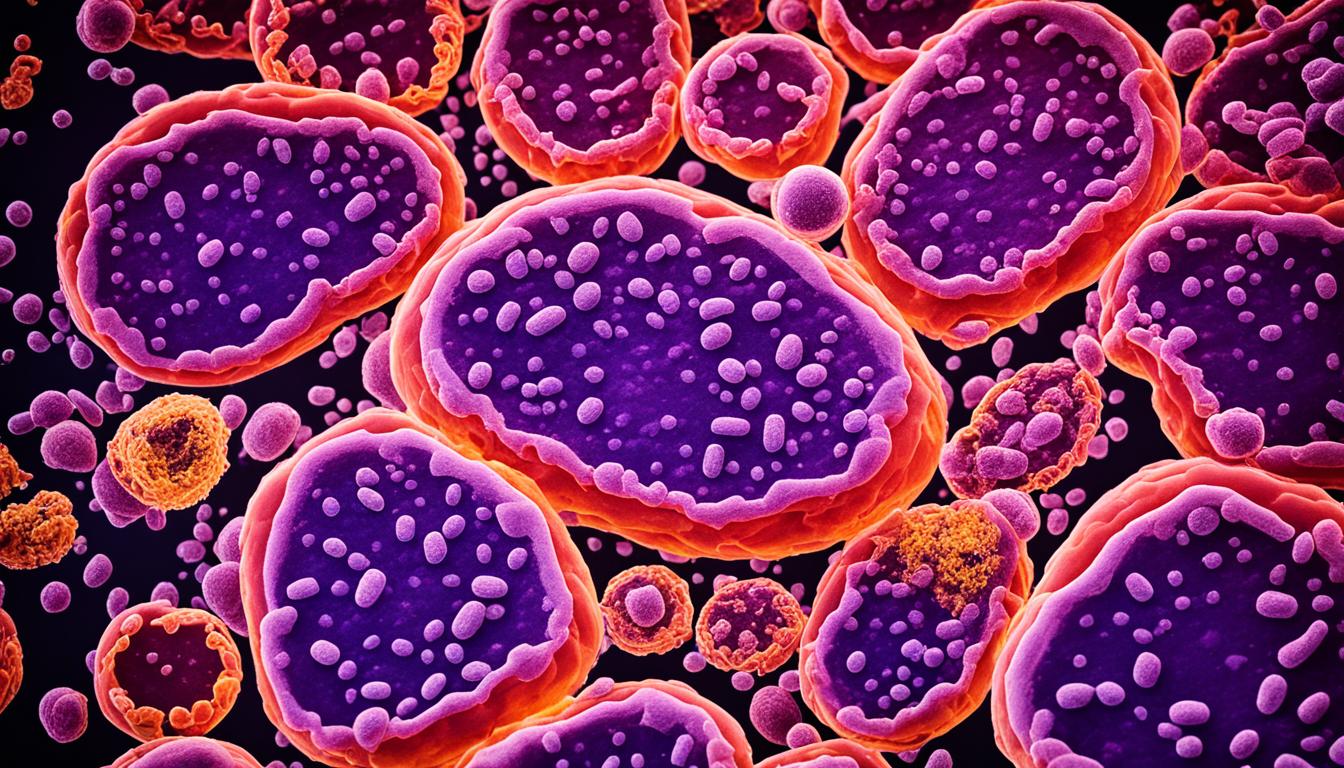Methicillin-resistant Staphylococcus aureus, or MRSA, is a tough bacteria. It doesn’t respond to many antibiotics. This makes it a big problem, especially in hospitals.
MRSA leads to different infections, from skin ones to more dangerous types. You can catch it by touching stuff with germs or from people who have it.
Doctors find MRSA with special tests on your wounds or blood. They usually treat it with medicines but might use other ways like stem cell treatment in the future.
To stay safe from MRSA, it’s important to keep your hands clean and make sure medical tools are germ-free.
Key Takeaways:
- MRSA is an antibiotic-resistant bacteria commonly found in healthcare facilities.
- MRSA can cause various infections, ranging from skin infections to severe pneumonia and bloodstream infections.
- Laboratory tests are used to diagnose MRSA infection.
- Antibiotics are the standard treatment, but alternative therapies like stem cell therapy are being explored.
- Prevention involves following strict infection control practices, including proper hand hygiene and equipment disinfection.
Understanding Methicillin-Resistant Staphylococcus Aureus (MRSA)
Methicillin-resistant Staphylococcus aureus (MRSA) is a type of bacteria. It is resistant to many antibiotics, including methicillin. This makes treating MRSA infections hard because common medicines can’t stop it.
MRSA causes different infections. These range from mild skin issues to severe problems like pneumonia. In healthcare, it’s linked with serious infections known as healthcare-associated infections.
MRSA changes the way antibiotics work. It uses a special protein to do this. This protein makes the antibiotics it encounters less effective.
Another way MRSA fights antibiotics is by using efflux pumps. These pumps push antibiotics out of the bacterial cell. This lowers the medicine’s ability to fight the infection.
Scientists are looking for ways to beat MRSA. One path is through vaccines. Vaccines can make the body produce tools to fight MRSA. This would lend a hand in stopping it from spreading.
An essential test for MRSA is the opsonophagocytosis assay. It checks how well antibodies can help kill MRSA. This test is key to figuring out how to defeat the bacteria.
Learning how MRSA works is vital to fighting it. By understanding MRSA’s defenses better, we can find new ways to stop it. This knowledge is important for developing better ways to prevent and treat MRSA.
Stem Cell Therapy: A Promising Approach for MRSA Treatment
Stem cell therapy brings a new hope in healing, especially for MRSA, an antibiotic-resistant infection. These unique cells can change into different types and control our body’s defense. They help rebuild tissues, bring down swelling, and strengthen our fight against MRSA.
This treatment for MRSA is not yet common, but early tests are positive. They’ve shown they can make MRSA less severe and help patients feel better. This could change how we manage MRSA, offering new ways to beat antibiotic resistance.
More study is needed to fully understand how stem cells work against MRSA. As we learn more, using stem cell therapy could lead to better treatments for not just MRSA, but other tough infections. It’s a light of hope in our fight against these serious health threats.
FAQ
Q: What is Methicillin-resistant Staphylococcus aureus (MRSA)?
A: MRSA is a superbug, meaning it’s a bacteria that fights off antibiotics. It causes many health problems and is often found in hospitals. This is worrying because it doesn’t respond to common drugs we use to fight infections.
Q: What are the symptoms of MRSA?
A: It mainly leads to skin issues such as abscesses or cellulitis. But it can also cause more serious problems like pneumonia or infections in the bloodstream.
Q: How is MRSA diagnosed?
A: To diagnose MRSA, doctors take a sample from a wound or from blood. This sample is then tested in a lab to see if the bacteria is MRSA.
Q: What are the treatment options for MRSA?
A: Doctors usually treat MRSA with strong antibiotics. But since some strains resist these drugs, other treatments like stem cell therapy are being looked into.
Q: How can MRSA infection be prevented?
A: To stop the spread of MRSA, it’s important to follow strict hygiene rules. This includes making sure to wash hands often and to clean medical tools thoroughly.
Q: What is the mechanism of resistance in MRSA?
A: MRSA’s defense system is mainly due to a special protein it makes. This protein makes antibiotics like methicillin and others not work against MRSA.
Q: Are there vaccines against MRSA?
A: Scientists are working on vaccines for MRSA. Their goal is to create a shot that can stop people from getting MRSA or spreading it to others.
Q: How does stem cell therapy work in MRSA treatment?
A: Stem cell therapy aims to use the body’s own repair system to combat MRSA. Stem cells can turn into different cell types and help the immune system fight infections better.
Q: What are the potential benefits of stem cell therapy for MRSA treatment?
A: Stem cell therapy might help by repairing damaged tissues, calming down inflammation, and making the body better at fighting off MRSA.
Q: Is stem cell therapy for MRSA treatment currently available?
A: Using stem cell therapy to fight MRSA is still new and being studied. But early research looks encouraging, especially in improving how patients recover from the infection.

